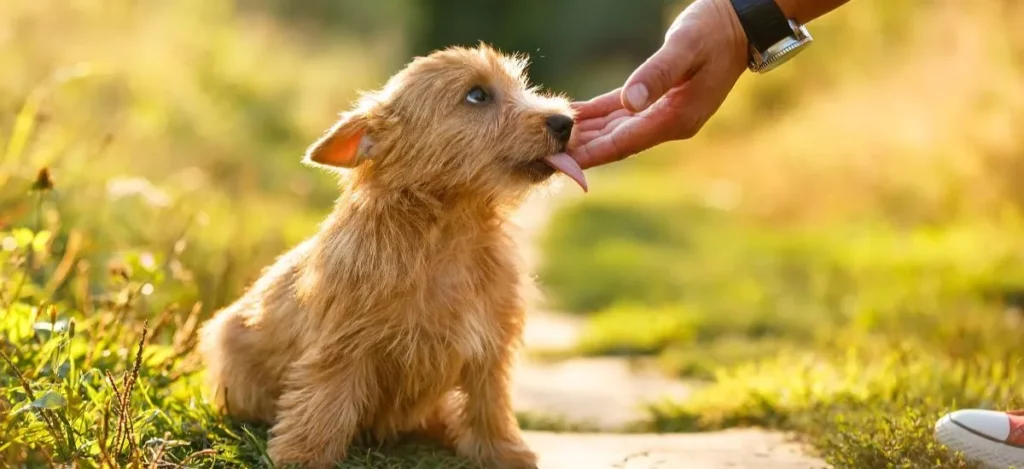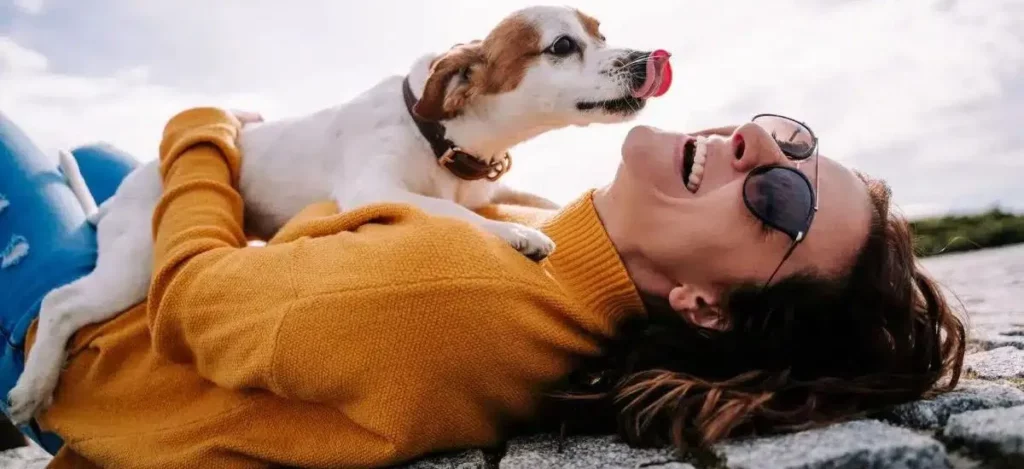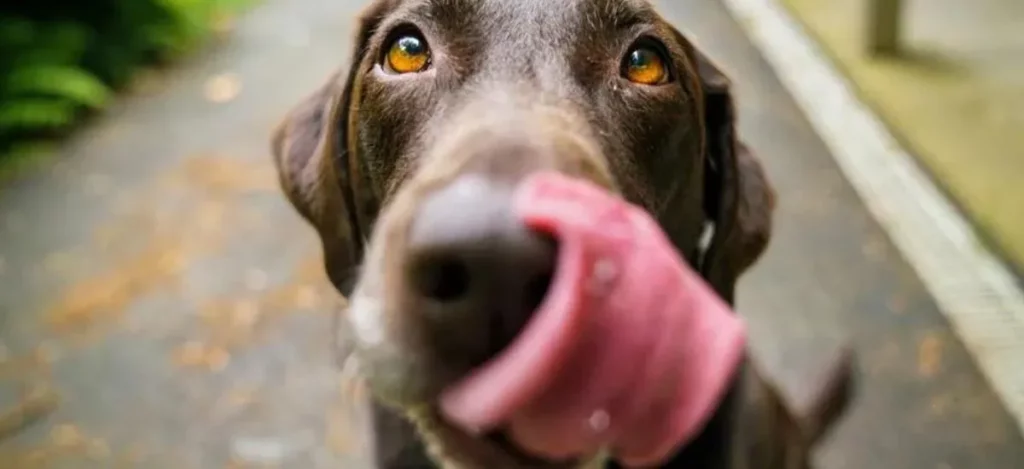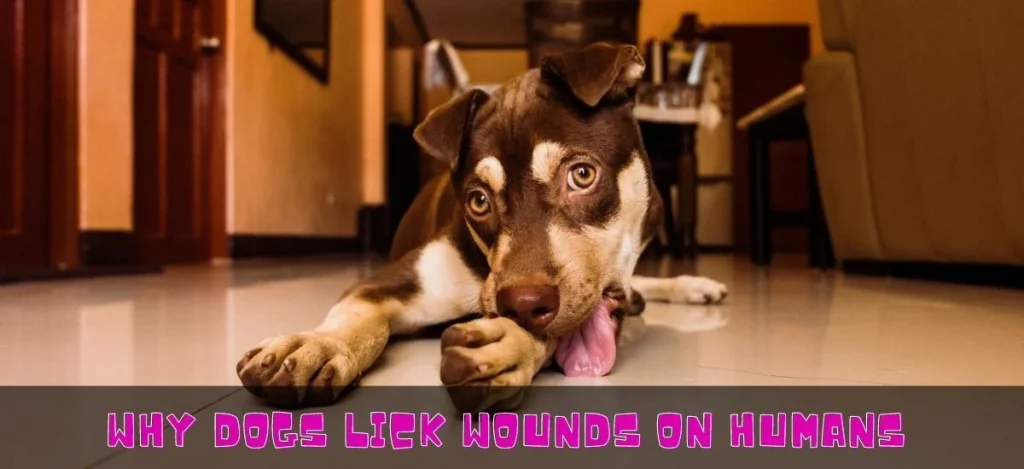In this article, I will tell you about the facts Why Do Dogs Lick Human Wounds and the benefits of licking the wounds, and many other related facts.
Humans, dogs, as well as other species, will desire to quickly attend to their wounds. It is an instinct. When your dog licks a wound, there are healing capacities in their saliva and it can also help cleanse the area. They are natural healers when it comes to grooming and cleaning.
Why Do Dogs Lick Wounds On Humans?
Animals recognize that a painful wound has to be comforted. When their companion or owner is hurt, they believe they must relieve the pain and comfort their companion. Humans, dogs, and other creatures will want to treat their wounds swiftly.
It’s a reflex. Saliva has therapeutic properties and may help cleanse a wound when your dog licks it. It is a natural healer when it comes to cleansing. It’s part of their wiring.

The Egyptians believed dog saliva could cure wounds. There are biological reasons why dogs lick wounds, just as they lick themselves and humans in general.
Your dog regards you as a member of their pack, their family. As a result, your dog will naturally want to help you and care for your wounds.
Your dog’s licking might be beneficial or harmful to the wound. Canine saliva may help clean and heal wounds. Their saliva is known to be antibacterial and therapeutic.
It’s crucial not to let your dog lick your wounds too much. It may create an infection in your wound and may not be good for your dog. A dog may also lick a wound for various reasons. It’s probably the same reason they lick your feet, hands, or face.
Whether it’s want, love, or aversion, it’s prudent to grasp their motivation. When dogs lick their wounds, the sutures are loose, or the wound irritates them. The same goes for why they lick you.
Why Do Dogs Usually Lick Your Cuts?
More significantly, careful licking of wounds may aid in the removal of dirt and debris that can impede healing and lead to infection if left unattended.
The mechanical motion of the tongue loosens foreign substances, then adheres to the saliva and is washed away from the wound by the saliva. So there are certain advantages to licking one’s wounds.
What Happens If A Dog Licks Your Cut?
Although licking wounds may protect against some infections, major risks are associated with allowing your dog to lick wounds. Licking too much may cause irritation, which can lead to hot spots, infections, and the possibility of self-mutilation in the long run.
Because it causes wounds to reopen, licking and chewing may further delay healing. Surgery areas are particularly risky for dogs to lick because of the anesthesia. Why Do Dogs Lick Human Wounds Licking may cause sutures to break down, and the wound reopens, forcing a return trip to the veterinarian.
Repairing surgical wounds that have been reopened is more difficult than repairing clean wounds. To prevent this, surgeons provide their canine patients with Elizabethan collars, which they should wear while sutures are in place or until the incision is fully healed (i.e., 10-14 days).
What To Do If A Dog Licks Your Wound?
The best course of action is to apply antibacterial ointment to the wound and keep it away from your dog. A dog’s natural need to lick wounds seems to be triggered when a wound is given.
It is, on the other hand, not suggested in the least. So keep it away from them, and if necessary, cover it with a bandage or something like that.
Should You Let Your Dog Lick Your Wounds?

Quite simply, you should never allow your dog to lick your wound under any circumstances. Frequently, the inside of your dog’s mouth is disgusting.
Furthermore, licking may bring germs into the body, leading to infection and other problems. Additionally, licking might aggravate your wound since a dog’s tongue isn’t exactly the gentlest thing to brush against your skin.
What Happens If A Dog Licks Human Blood?
It would help if you refrained from letting your dog lick your wound unless you are lost in the middle of nowhere with no access to modern medical care or facilities.
However, although this is unlikely to have a substantial influence on most people, it may introduce harmful bacteria into your wound, increasing the likelihood of infection.
Why Do Animals Lick Their Wounds?
Dogs, cats, tiny rodents, horses, and primates are known for licking wounds and grazing on them. Saliva includes a substance known as tissue factor, which aids in the blood clotting process. Lysozyme is an enzyme that may be found in various body tissues.
It has been shown to assault the cell walls of numerous gram-positive bacteria, assisting in the body’s defense against infection. One of the most common reasons dogs lick their wounds is to relieve the pain and discomfort they are experiencing.
Licking the location of the cut causes the brain to become overstimulated, which in turn might assist in temporarily dulling the discomfort. It is analogous to people massaging or clutching their wounds in their hands.
How To Keep Your Dog From Licking Your Wounds?
If your dog has an open wound, whether it is from surgery or a recent accident, it will instinctively want to lick the wound. Unfortunately, licking the incision may cause it to reopen and get infected.
The usual method of preventing a dog from licking a wound is to use a cone or collar. A sleeve or a very strong bandage might also be used to cover the wound. Why Do Dogs Lick Human Wounds In conjunction with tactics, occupy your dog’s attention to distract their focus off the wound as much as possible while it is recovering.
Can You Get An Infection From A Dog Licking Your Wound?
Although licking wounds may protect against some infections, major risks are associated with allowing your dog to lick wounds. Licking too much may cause irritation, which can lead to hot spots, infections, and the possibility of self-mutilation in the long run.
Is It Good For A Dog To Lick Your Wounds?
Although licking wounds may protect against some infections, major risks are associated with allowing your dog to lick wounds.
Licking too much may cause irritation, which can lead to hot spots, infections, and the possibility of self-mutilation in the long run. In addition, because it
causes wounds to reopen, and licking and chewing may further delay healing. Why Do Dogs Lick Human Wounds.
Does Dog Saliva Heal Wounds?

The belief that allowing dogs to lick wounds will help them heal is deeply rooted in human culture. It began in ancient Egypt, continued through the Grecian period, and reached common folk culture. But is there any science to support it? Yes and no!
Dog saliva and human saliva contain compounds that may help wounds heal. Wounds in the mouth heal faster than those elsewhere in the body.
This was studied by Menno Oudehoff of the University of Amsterdam, who found that saliva contains a protein called histatin, which has the ability to ward off infection. Histatin may help cells from the surface of the skin to close a wound more quickly—all good things to promote healing.
Another pharmacologist from the London School of Medicine and Dentistry found that nitrites in saliva, when in contact with the skin, break down into nitric oxide, which may help protect wounds from infection. And researchers at the University of Florida discovered in saliva a protein called nerve growth factor, which also speeds up the healing of wounds.
Does Dog Saliva Infect Wounds?
Unfortunately, dog saliva may infect wounds and cause infection. In addition, there are a variety of bacteria found in the mouths of animals that may cause illnesses in humans, some of which are potentially life-threatening.
One example is a bacterium known as Pasteurella, which thrives in environments with little or no oxygen, such as severe wounds.
Conclusion
Does Dog Saliva Infect Wounds? Why do dogs lick wounds on humans? To have a healthy and loving connection with our dogs, we must first establish one with ourselves as dog owners.
They want to comfort us in all of our moments of need because they care about us, and we should allow them to do so as long as it is safe and pleasant for everyone involved.
I hope you liked reading this article and got some valuable information.
Also Read: Can Dogs Have Carrots?

